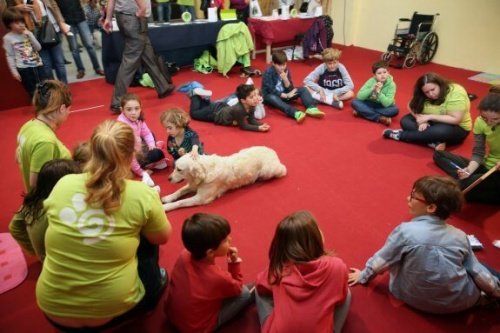Hearing Dogs and How They Can Change a Deaf Child's Life

We can say confidently that dogs are great playmates for children. They also help them grow up to be healthier, happier, more sensitive and more responsible people. But they can do even more.
These good-hearted creatures can also be extremely helpful for children with medical conditions, whether they be physical, mental or emotional. Today, we’ll talk about hearing dogs and how they can impact a deaf child’s life.
Dogs in the lives of deaf children

Hearing dogs are a type of assistance dog. They are trained to help children with hearing disabilities, practically becoming these children’s ears. That’s why it’s not unreasonable to say that hearing dogs have the power to change a deaf child’s life. With the help of their four-legged guardian angel, a child can:
- Be more autonomous and independent.
- Socialize better.
- Perform better at school and behave better.
In addition, hearing dogs give the family peace of mind and assurance that their child will be safe and happy.
What do hearing dogs do?
Dogs trained to facilitate deaf children are trained to:
- Recognize alarm clocks.
- Warn the child about certain sounds: doorbells or telephone ringtones, horns, different kinds of alarms, etc.
- Let the child know that their parents are calling them.
- Warn them of possible danger.
Plus, hearing dogs and children often turn into inseparable playmates.
Selection and training of hearing dogs
Along with the sense of smell, hearing is a dog’s most highly developed sense. And man has taken advantage of this special ability our furry friends have to give deaf people a better quality of life.
Hearing dogs, after being socialized, are trained to develop their auditory skills. Breeds that are obedient, social and capable of dealing with a wide variety of situations are preferred. Popular hearing dog breeds are:
- Cocker spaniels
- Poodles
- Labradors
After training, mixed-breed dogs can also be very good at this type of work.
Assistance dogs
Dogs that help people with hearing disabilities fall into the category of assistance dogs, which are dogs who have received training to provide physical and psychological support to people with any type of disability. For example:
- Guide dogs or service dogs accompany the blind.
- Warning dogs help people with conditions like hypoglycemia and epilepsy.
- Service dogs have undergone training to help people with certain physical and motor problems.
Dogs are good for us

Every child should get the chance to experience the wonderful gift of growing up with a pet. We’ve detailed the many physical, psychological and emotional benefits pets have for children in other articles here at My Animals that you might be interested in as well.
But it never hurts to reiterate that a child with a furry friend is a happier child. That’s true regardless of whether the child is completely healthy or has a physical or mental disorder.
Therefore, we humans shouldn’t forget to take a moment to thank these animals for all they do for us. Hearing dogs with deaf children are just one wonderful example out of many.
We can say confidently that dogs are great playmates for children. They also help them grow up to be healthier, happier, more sensitive and more responsible people. But they can do even more.
These good-hearted creatures can also be extremely helpful for children with medical conditions, whether they be physical, mental or emotional. Today, we’ll talk about hearing dogs and how they can impact a deaf child’s life.
Dogs in the lives of deaf children

Hearing dogs are a type of assistance dog. They are trained to help children with hearing disabilities, practically becoming these children’s ears. That’s why it’s not unreasonable to say that hearing dogs have the power to change a deaf child’s life. With the help of their four-legged guardian angel, a child can:
- Be more autonomous and independent.
- Socialize better.
- Perform better at school and behave better.
In addition, hearing dogs give the family peace of mind and assurance that their child will be safe and happy.
What do hearing dogs do?
Dogs trained to facilitate deaf children are trained to:
- Recognize alarm clocks.
- Warn the child about certain sounds: doorbells or telephone ringtones, horns, different kinds of alarms, etc.
- Let the child know that their parents are calling them.
- Warn them of possible danger.
Plus, hearing dogs and children often turn into inseparable playmates.
Selection and training of hearing dogs
Along with the sense of smell, hearing is a dog’s most highly developed sense. And man has taken advantage of this special ability our furry friends have to give deaf people a better quality of life.
Hearing dogs, after being socialized, are trained to develop their auditory skills. Breeds that are obedient, social and capable of dealing with a wide variety of situations are preferred. Popular hearing dog breeds are:
- Cocker spaniels
- Poodles
- Labradors
After training, mixed-breed dogs can also be very good at this type of work.
Assistance dogs
Dogs that help people with hearing disabilities fall into the category of assistance dogs, which are dogs who have received training to provide physical and psychological support to people with any type of disability. For example:
- Guide dogs or service dogs accompany the blind.
- Warning dogs help people with conditions like hypoglycemia and epilepsy.
- Service dogs have undergone training to help people with certain physical and motor problems.
Dogs are good for us

Every child should get the chance to experience the wonderful gift of growing up with a pet. We’ve detailed the many physical, psychological and emotional benefits pets have for children in other articles here at My Animals that you might be interested in as well.
But it never hurts to reiterate that a child with a furry friend is a happier child. That’s true regardless of whether the child is completely healthy or has a physical or mental disorder.
Therefore, we humans shouldn’t forget to take a moment to thank these animals for all they do for us. Hearing dogs with deaf children are just one wonderful example out of many.
This text is provided for informational purposes only and does not replace consultation with a professional. If in doubt, consult your specialist.








